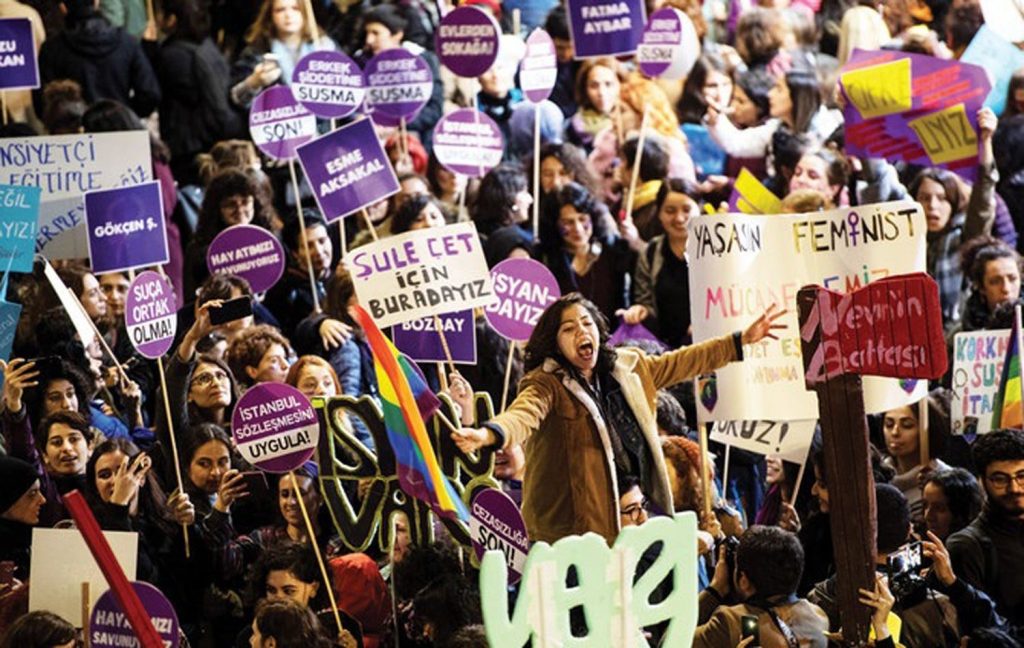Journalist Filiz Pehlivan writes about the recent women’s rights agenda in Turkey, that is related to the constitutional amendment proposed by the government and the feminist backlash against it.

Filiz Pehlivan / Yetkin Report
On October 28, we patiently listened to President Recep Tayyip Erdoğan’s two-hour speech at the “Beginning of the Century of Türkiye” programme. During one and a half hours of his speech, Erdoğan listed the services and activities of the ruling Justice and Development Party (AKP) in the past tense. The programme was held a day before the Turkish Republic marked its first century, on October 29, Republic Day. Did the AKP, which spent 20 years of the first century in power, expect us to forget this century while talking about a new beginning? What good news could he give for the future as he started a new century? While the expectations were quite high, what we encountered was a vision embodied in mega project Kanal Istanbul.
What followed were the adjective phrases of the century: “The century of sustainability, peace, success, stability, production, efficiency, power, digital, communication, science, development, peace, values, right, compassion, future, and youth.”
In fact, the century of youth was not initially included in the prepared website. It is possible that the President felt the need to include young people, who prefer to shout slogans instead of listening at every moment of the meeting, in the vision of the century.
However, the President closed his eyes to the fact that women, who have become the symbols of the resistance in many countries of the world these days in their fight to regain their freedom or who succeed in forming a majority in the governments of some countries, will be the dominoes of the coming years.
The century of women: Constitutional regulation
Erdogan’s discourse on women in his Century of Türkiye speech was again shaped around the concept of family.
“Women’s rights and the protection of the family are not alternatives to each other,” he said, reminding that they will submit their constitutional amendment proposal to the Parliament in the coming days.
“We have prepared a constitutional proposal that will guarantee the right to education and work for all our girls and sisters, whether their headscarves are covered or not, and protect our family institution from the threat of perverted tendencies,” he said.
Speaking to the muftis on October 31, he asked the muftis to talk about the family being threatened by heretical currents in their Friday sermons.
He said that with the constitutional amendment, while providing security for the headscarf, they also aimed to protect the family threatened by deviant currents, and that a strong family means a strong state. He even gave an example. Noting that he learned that “a perverse process in Mexico was placed on a legal basis” and that “there are people who want to do this in our country,” he said, “We will not make the Muslim community a victim to anyone.” He also added how bad the situation is in the countries that have these types of freedoms, but he did not say which countries these are.
EŞİK objects to the constitutional amendment proposal
While there is a danger of disturbing, marginalizing, and targeting some segments of society with the proposed constitutional amendment; the claim of a civil, democratic, liberal, pluralistic constitution that will strengthen welfare, justice, and peace, which is declared as one of the first goals of Türkiye’s century, is not credible.
The Women’s Platform for Equality – EŞİK, which objected to the constitutional amendment proposal, made a call not only to the government but also to the opposition parties and the public:
“The principles of equal citizenship and secularism, which are the basic principles of the Republic, cannot be compromised. Fundamental human rights and freedoms cannot be put to a referendum. Those who do not implement the Constitution cannot make a Constitution.”
In the statement made by EŞİK, which brings together more than 300 women’s organizations, it was stated that: “While the government started with the claim of preventing discrimination against women wearing headscarves with the amendment to Article 24 of the Constitution; the intent is actually to determine how women will dress, where and how they will wear a headscarf. With the proposed changes in women’s clothing, the space for intervention in women’s lives will be opened.”
You can read the full article here.

